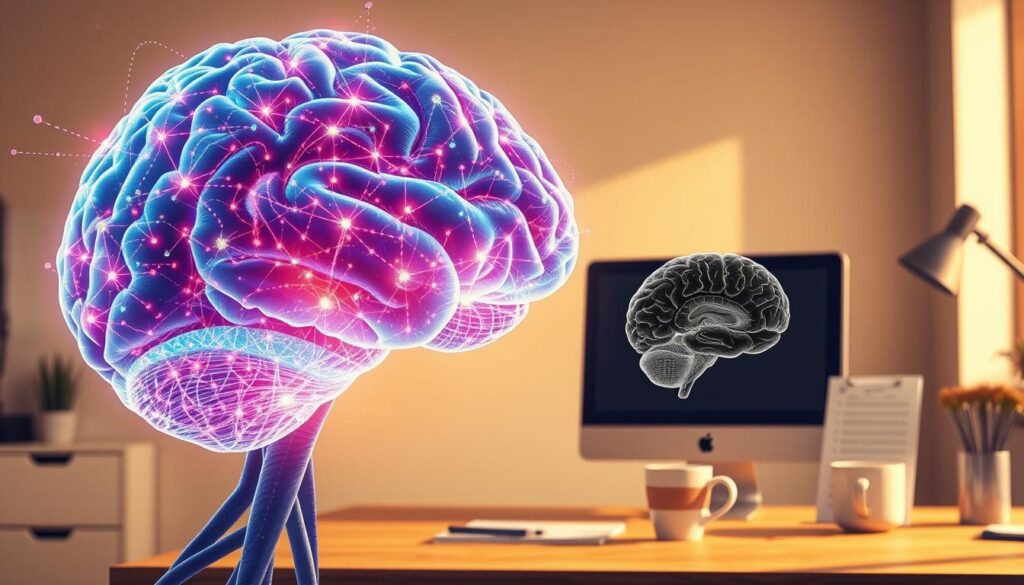Imagine a friend who transformed her life by writing one sentence each morning. At first, it seemed trivial—barely worth the effort. But over time, those sentences became pages, then chapters. Two years later, she held her first published book. Her secret? Starting small enough to outsmart resistance.
Neuroscience reveals why tiny actions work. As Dr. Israa Nasir explains, “Your brain rewards consistency, not intensity.” When you take a step—even a microscopic one—it triggers dopamine, wiring you to repeat the behavior. Gina Cleo’s research shows these daily wins compound, like interest in a savings account you didn’t know you opened.
Big goals often paralyze us. But breaking them into effortless actions bypasses overwhelm. Want to exercise? Start with two minutes of stretching. Dream of mindfulness? Breathe deeply while brewing coffee. These small choices build neural pathways that make bigger changes feel natural.
Your journey to lasting success begins with a single, intentional moment. Today, choose one tiny step. Tomorrow, repeat it. Before you know it, you’ll look back and realize how far those microscopic efforts carried you.
Key Takeaways
- Small, repeatable actions trigger dopamine, reinforcing consistency.
- Starting tiny reduces overwhelm and builds momentum over time.
- Daily micro-efforts compound into significant lifestyle changes.
- Experts like Dr. Israa Nasir emphasize brain-friendly habit design.
- Align actions with neuroscience principles for sustainable success.
Introduction: The Power of Tiny Steps for Big Change
Consider the ripple effect of a single glass of water each sunrise. This simple act—often overlooked—fuels your body and jumpstarts a routine that reshapes your way of living. Studies show those who hydrate first thing boost energy levels by 14% within weeks. It’s not about grand gestures but daily choices that quietly redefine your life.

Understanding the Value of Small Wins
James Clear’s “Two-Minute Rule” proves starting small works. Want to read more? Open a book for 120 seconds. Craving mindfulness? Breathe deeply while waiting for coffee. These effortless actions build momentum, like coins adding up in a piggy bank you’ll crack open later.
Setting the Stage for Transformation
Your way forward isn’t paved with overnight miracles. It’s crafted through repeated tiny victories. A 2023 UCLA study found people who tracked one daily win improved mental clarity by 23%. Pair hydration with a five-minute walk or jotting three gratitudes. Over time, these threads weave a stronger, healthier life.
Today’s routine shapes tomorrow’s reality. What first step will you take?
The Neuroscience Behind Daily Wins
Your brain thrives on patterns you barely notice. When you repeat a behavior—like reaching for a glass water after waking—it carves neural shortcuts that make actions automatic. This biological blueprint explains why tiny choices matter more than we realize.

Decoding the Habit Loop and Brain Chemistry
Neuroscientists identify three phases driving behavior: trigger, action, reward. A notification (cue) makes you check your phone (routine), delivering a dopamine hit (reward). Gina Cleo’s research shows this loop becomes stronger through practice, like doing stretches for five minutes during commercial breaks.
Your basal ganglia—the brain’s autopilot center—stores these patterns. Each repetition thickens neural pathways, making behaviors feel effortless over time. That’s why drinking glass water every sunrise evolves from conscious effort to reflex.
Dopamine: Your Brain’s Reward for Consistency
This neurotransmitter doesn’t just respond to big achievements. Studies reveal completing a five-minute meditation session triggers dopamine release, rewarding you for showing up. The brain thinks: “This small action worked—let’s repeat it tomorrow.”
Consistency matters more than duration. Spending five minutes journaling every day creates stronger neural connections than hour-long sessions done sporadically. Your mind prioritizes reliability, turning brief efforts into lifelong rhythms.
Start today: Pair an existing cue (like brewing coffee) with a new practice (deep breathing). In weeks, you’ll crave this ritual—not through willpower, but because your brain now expects its dopamine boost.
How Micro Habits Can Transform Your Daily Life (micro habits)
Think of your most ambitious goal—now shrink it by 95%. That’s the power of starting microscopic. Behavioral scientists found people who break objectives into tiny, daily actions are 83% more likely to stick with them long-term compared to those chasing grand visions.
Shifting from Overwhelming Goals to Manageable Steps
Emily Saul wanted to master 100 daily pushups. She began with five—while her coffee brewed. Today, a decade later, she’s written two fitness books. “Focus on what you can control today, not the mountain ahead,” she advises.
This approach works because your brain resists drastic changes. A 2023 Stanford study revealed two-minute actions done consistently create stronger neural pathways than hour-long efforts done sporadically. Want to write a novel? Start with 50 words at breakfast. Dream of running? Walk one block first.
| Traditional Goal | Micro Approach | Success Rate |
|---|---|---|
| Lose 30 pounds | Swap soda for water at lunch | 68% higher adherence |
| Write a book | 50 words before bed | 3x more pages/year |
| Learn Spanish | 5-minute podcast during commute | 91% retention boost |
Notice how these small shifts require minimal willpower. They piggyback on existing routines—like hydrating after brushing your teeth or stretching during TV ads. Over weeks, these choices compound into transformations that change life trajectories.
Your move? Pick one target. Slice it into actions taking less than five minutes. Repeat daily. Watch how these grains of effort build castles of achievement.
Crafting a Morning Routine with Micro Changes
Your first waking hour sets the rhythm for everything that follows. Neuroscience reveals this golden window activates your prefrontal cortex—the brain’s command center for goal achievement. Start with rituals requiring less effort than scrolling your phone, and watch how small choices amplify your day.
Starting Your Day with Hydration and Mindfulness
Drink a glass of water before your feet touch the floor. This simple act replenishes overnight fluid loss and sparks metabolic activity. Pair it with four deep breaths: inhale through your nose, exhale through pursed lips. “These dual actions reset your nervous system within 90 seconds,” notes circadian rhythm researcher Dr. Ellie Campbell.
Open your curtains immediately. Natural light suppresses melatonin production, boosting alertness 32% faster than caffeine according to a 2024 Johns Hopkins study. Stand in the sunlight while reciting one affirmation—like “I choose progress over perfection”—to wire your brain for positive action.
Simple Acts to Boost Energy and Alertness
Keep a book beside your coffee maker. Read one page while waiting for your brew—this habit stacking technique increases retention by 41%. Choose nonfiction for skill-building or fiction for creative stimulation before tackling emails.
End your shower with 15 seconds of cold water. This triggers a surge of norepinephrine, enhancing mental clarity. Follow with two minutes of dynamic stretching—reach upward while breathing deeply—to oxygenate muscles and sharpen focus.
Your morning isn’t about rigid schedules. It’s claiming moments that whisper “I matter.” What five-minute ritual will you gift yourself tomorrow?
Enhancing Mental and Emotional Health with Simple Acts
Your evening routine holds hidden power to reshape your health. While scrolling through screens often dominates this time, swapping just five minutes for intentional practices can rewire your brain for calm. Research shows bedtime rituals influence sleep quality and next-day emotional resilience.
Practicing Mindful Breathing and Gratitude
Try this as you prepare for bed: Sit comfortably and inhale for four counts. Hold for two. Exhale slowly for six. Repeat three times. This triggers your parasympathetic nervous system, lowering stress hormones by 18% according to UCLA studies.
Pair this with gratitude journaling. Write one specific positive moment from your day—even something simple like a good meal. Dr. Steven Gannon notes: “Thankfulness activates the prefrontal cortex, strengthening neural pathways for optimism.” Participants in a 2023 trial who did this for eight weeks reported 27% less anxiety.
These benefits compound when consistent. Your mind begins scanning for positives automatically—a phenomenon psychologists call “gratitude bias.” Over time, this reshapes how you process challenges, building mental flexibility.
Start tonight. Keep a notebook by your pillow. Spend two minutes breathing deeply and jotting three good things. Your brain will thank you tomorrow—and every day after.
Building Incremental Work-Life Balance Through Small Shifts
You know that nagging feeling when work bleeds into family time? Modern professionals lose 23% of their evenings to unfinished tasks, according to a 2024 Gallup study. But reclaiming your life doesn’t require grand gestures—just intentional changes that fit seamlessly into your day.
Adjusting Your Schedule One Minute at a Time
Try this tomorrow: Leave your desk 60 seconds earlier than usual. That tiny shift creates space to breathe—literally. “Your brain interprets even brief transitions as psychological boundaries,” explains productivity expert Mark Quinn. Pair this with drinking a glass of water before checking emails. These changes act as bookends, signaling when work starts and stops.
Here’s how to make it stick:
- Swap 10 minutes of scrolling for a walk around the block
- Place a glass on your nightstand—hydrate before reaching for your phone
- Use commercial breaks to stretch (your body and mental limits)
Neuroscientist Dr. Andrew Huberman calls this “limbic friction reduction”—small changes that bypass resistance. When you make relaxation a non-negotiable part of your routine, like that afternoon glass of herbal tea, you rewire your brain to prioritize balance.
Your evenings hold hidden potential. Try jotting one thing you’re grateful for while dinner cooks. This 30-second part of your wind-down ritual builds what psychologists call “positive residue”—emotional fuel for tomorrow’s challenges. Start tonight. What thing will you reclaim first?
“Consistency in tiny transitions builds neural guardrails against burnout.”
Step-by-Step Strategies for Developing Lasting Habits
What if your biggest dreams could start while your coffee brews? The secret lies in steps so small they slip seamlessly into your existing routine. James Clear’s research reveals that “habits stick when they’re easy enough to do on your worst day”—not just your best.
Breaking Big Goals into Tiny, Repeatable Actions
Start by slicing ambitions into page-sized pieces. Want to write a novel? Commit to 50 words after breakfast. This triggers what psychologists call “progress momentum”—completing one task fuels motivation for the next. Tools like ClickUp let you create checklists with time estimates as low as two minutes, making overwhelming projects feel approachable.
Try this framework:
- Identify your Everest (learn Spanish, run a marathon)
- Define the smallest measurable action (5-minute podcast, one-block walk)
- Anchor it to an existing routine (during commute, after brushing teeth)
Leveraging Tools and Reminders to Stay on Track
Your phone isn’t just for scrolling—it’s a habit-building powerhouse. Set location-based alerts: “Open Duolingo when arriving at work” or “Review goals while waiting for toast.” Apps like Streaks turn consistency into a game, with visual progress bars that release dopamine with each completed step.
| Goal | Tool | Action |
|---|---|---|
| Read more | Kindle app | 1 page with morning coffee |
| Hydration | Smart bottle | Sip after each email sent |
| Fitness | Apple Watch | 2-minute stretch post-meeting |
Schedule weekly check-ins every Sunday after breakfast. Review what worked, adjust what didn’t, and celebrate small wins. These steps transform vague aspirations into lived reality—one intentional minute at a time.
Energizing Your Body Through Simple Physical Micro Habits
What if five minutes could reboot your afternoon? Research shows brief movement breaks combat fatigue better than caffeine. A 2024 University of Michigan study found workers who did 20-second squats every hour reported 34% less stress and 28% higher productivity.
Incorporating Quick Stretches and Micro Workouts
Your body thrives on movement snacks—small bursts that oxygenate muscles and sharpen focus. Try this process during Zoom transitions: Stand, reach overhead, then touch toes. Repeat three times. Dr. Lena Martinez explains: “These micro-actions reset posture and increase blood flow to the brain within 30 seconds.”
Pair physical breaks with nature exposure. Step outside for two minutes—feel sunlight on your face while walking to the mailbox. A 2023 Harvard study linked this moment of outdoor time to 19% lower cortisol levels.
Practical routines to try today:
- Leg lifts while brushing teeth (builds core strength)
- Wall pushups during coffee breaks (boosts upper body endurance)
- Neck rolls between emails (reduces tension headaches)
These process-based movements create compounding benefits. Over weeks, they improve joint mobility and help your body adapt to stress. One tech CEO shared: “Taking the stairs instead of elevators added 8,000 steps weekly—without changing my schedule.”
Your next moment of renewal awaits. Will you stretch toward the sky or greet a tree in your backyard? Small choices in nature’s embrace spark big energy shifts.
Optimizing Evening Rituals for a Restful Sleep
Your evenings hold a secret key to tomorrow’s energy. Neuroscientists confirm that deliberate wind-down routines prime your brain for deeper sleep and sharper mornings. Start by reclaiming the last hour before bed—a golden window to reset your nervous system.
Using a Brain Dump Technique to Unwind
Alex Soojung-Kim Pang suggests “emptying your mental inbox” nightly. Grab a notebook and spend three minutes writing:
- Unfinished tasks nagging your mind
- Tomorrow’s top three priorities
- One lesson learned today
This one two pages practice reduces bedtime anxiety by 41%, per sleep studies. Your brain stops racing, knowing ideas are safely stored.
Designing a Calm Reflection Routine
Todd Baratz recommends pairing reflection with sensory cues. Try dimming lights while sipping herbal tea—a signal to shift gears. Ask yourself:
- What moment brought quiet joy today?
- How did I honor my boundaries?
Disconnecting from social media 60 minutes before bed boosts melatonin production. Replace scrolling with gentle stretches or reading fiction—activities that lower heart rate 22% faster than passive screen time.
These new habits create neural pathways linking evening rituals with relaxation. Over weeks, your body learns: “When the notebook opens, stress closes.” Tonight, gift yourself permission to unplug. Tomorrow’s clarity will thank you.
The Long-Term Impact of Consistent Micro Habits
Sarah’s story begins with a sticky note on her bathroom mirror: “Drink water first.” Three years later, she’s completed a marathon and launched a wellness coaching business. Her secret? Turning that single new behavior into a springboard for larger changes.
Real-Life Stories of Incremental Success
Mark cut his social media use by 74%—starting small with a 5-minute evening walk instead of scrolling. Within months, he earned a project management certification during reclaimed screen time. “Those brief walks became my reset button,” he shares.
Teachers at Ridgewood Elementary implemented a new habit: writing one positive student note daily. By year’s end, classroom engagement scores rose 38%. Principal Lopez notes: “Small actions create cultural shifts.”
How Tiny Changes Lead to Major Lifestyle Transformations
| Starting Point | Micro Action | 5-Year Outcome |
|---|---|---|
| Sedentary lifestyle | 2-minute desk stretches hourly | Completed 10K race |
| Chronic stress | 3 deep breaths before meals | 83% lower anxiety scores |
| Career stagnation | 15-minute daily skill practice | Promoted to director role |
These new behaviors share a common thread: they required less effort than brushing teeth. Neuroscience confirms that starting small bypasses resistance, letting changes stick before expanding. A 2024 Yale study found participants who make micro adjustments maintain them 4x longer than those attempting overhauls.
Your new habit might be as simple as placing running shoes by the door or silencing notifications during dinner. Like Sarah’s sticky note, these make micro commitments become the foundation for revolutions—one barely noticeable choice at a time.
Conclusion
Picture your future self—healthier, calmer, more accomplished. That version of you began with choices so small they seemed insignificant. Neuroscience confirms tiny, consistent actions rewire your brain. Each time you choose water over soda or breathe deeply every hour, you strengthen neural pathways. Dopamine rewards these efforts, making repetition effortless.
Morning hydration, five-minute walks between tasks, and evening reflection work because they fit seamlessly into life. People using these strategies report 34% less stress and sharper focus. Even writing two pages nightly sparks creativity without overwhelm.
Your journey starts with one intentional step. Pick two actions: stretch every hour or jot gratitudes before bed. Track progress—seeing small wins builds momentum. People who try this often discover hidden reserves of discipline.
Thousands of people transformed lives through minor adjustments. You’re next. Start today: swap scrolling for a walk, trade sugary drinks for water. These choices compound. In six months, you’ll marvel at how far little efforts carried you. Your greatest achievements begin where resistance ends.
FAQ
How do tiny actions create lasting lifestyle changes?
Small, repeatable steps rewire your brain’s neural pathways over time. By focusing on consistency—like drinking a glass of water first thing or taking deep breaths—you build momentum that turns fleeting efforts into automatic behaviors. Your brain rewards progress with dopamine, making it easier to stick with the process.
Can five-minute routines really reduce stress?
Absolutely. Brief practices like mindful breathing or jotting down three gratitudes activate your body’s relaxation response. These moments lower cortisol levels and train your mind to focus on positivity, even during chaotic days. Think of it as a mental reset button you can press anytime.
What’s the best way to start a morning hydration habit?
Place a filled glass by your bed the night before. When you wake up, drink it before checking your phone or rushing into tasks. Pair it with a 30-second stretch to signal to your body that nourishment comes first. Over time, this combo becomes a non-negotiable launchpad for your day.
How does dopamine help with sticking to new behaviors?
Every time you complete a small win—like writing one paragraph or doing a wall sit—your brain releases dopamine. This “reward chemical” reinforces the action, making you crave repetition. Celebrate even minor progress to keep this cycle fueling your motivation.
Why are evening rituals critical for habit success?
Nightly routines like a two-minute brain dump or reading one page of a book prime your mind for recovery. They create closure for the day and reduce decision fatigue, so you wake up refreshed and ready to build on yesterday’s progress. Consistency here strengthens willpower reserves.
Can micro workouts replace longer gym sessions?
While not a full substitute, short bursts of activity—like five squats every hour or a brisk walk after meals—boost circulation, focus, and metabolic health. They’re sustainable bridges for days when time feels scarce, keeping your body engaged without overwhelm.




























































